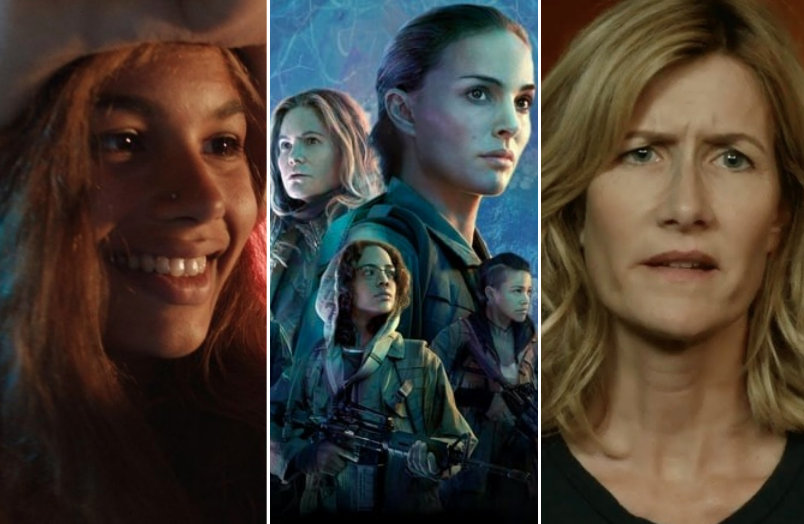The 13 Best Movies of 2018, According to the IndieWire Film Staff

Why 13? The obvious answer is because there are 13 members of the IndieWire film team. But also, how could you possibly limit any list of 2018’s finest cinematic riches to a mere 10? Every now and then the internet likes to debate “What’s the best film year ever?” and though we’re not willing to be quite so bold as to say 2018, it definitely ranks high among contenders. This was an extraordinary year for film, by any measure, from a massive blockbuster like “Mission: Impossible — Fallout” to the mesmerizing arthouse reveries of “Cold War” and “Roma.” (Think on this: when’s the last time we had two such beautiful black-and-white films released back to back?) To determine IndieWire’s collective Best Movies of 2018, each member of our film team submitted a ranked Top 10 list — and then it was up to each of us to say a little something about one film that had particularly affected us. Scroll through to read each staffer’s thoughts about the year’s best, and click through to page three, where we’ve listed each of our individual ballots.
13. “Mission: Impossible – Fallout”
The “Mission Impossible” franchise has always been a welcome reprieve from the television-ization of the summer blockbuster — a vehicle that can be driven by a wide range of action directors to create an edge-of-your-seat thrill ride utilizing practical action. With “Fallout,” though, Christopher McQuarrie broke two rules: he returned to direct a second film and created a sequel, of sorts. His script no longer simply wove together and motivated the death-defying set pieces, but rather the action became a natural and perfect extension of the dramatic tension. McQuarrie has honed his craft to the point where each action beat and jaw-dropping stunt becomes an expression of character and conflict, never wasting a shot or moment. The “North By Northwest” madcap race, from urban motorcycle chase scene to two helicopters wrestling along the mountain tops, becomes an exploration of Ethan Hunt in existential crisis, striking at the heart of the character as well as the star who created him. —Chris O’Falt
12. “If Beale Street Could Talk”
There’s injustice and tragedy at the heart of Barry Jenkins’ adaptation of James Baldwin’s 1974 novel about a young African-American man named Fonny (Stephan James), who’s incarcerated for a crime he did not commit, and Tish (Kiki Layne), the love of his life, who waits for him. But though it’s a film about struggle, what sticks with you is the love that’s expressed (James has said he kept “Romeo & Juliet” in mind during filming), love that’s romantic and familial and represented in the perseverance of a culture and community despite everything lined up against it. Jenkins has made a hopeful film, though it’s one that doesn’t gloss over harsh realities. There’s darkness here and hauntedness — a riveting monologue by Brian Tyree Henry, as a jovial ex-con who slowly reveals through his words the depth of his fear and despair, is easily the best long-take of the year — but stunning beauty too. —Christian Blauvelt
11. “The Tale”
Jennifer Fox’s haunting memory play about one woman’s reckoning with her past is easily the bravest film about sexual trauma ever made. Borne out of Fox’s lived experience, which from now on should be required viewing for putting sexual trauma onscreen, “The Tale” is a study in the stories we tell ourselves in order to survive. Laura Dern’s Jennifer is a radiant gem of a character; quick-witted, strong-willed, and with an obsessive desire to control her own narrative. With each shifting flashback, Fox carefully revises her surrogate’s perspective, revealing the ugly half-truths behind the haze. As the protective layers of Jennifer’s memory slowly slip away, the film offers an unparalleled window into a mind contorting itself to make room for the unthinkable, and a searing commentary on the act of storytelling itself. —Jude Dry
10. “First Man”
Leave it to Damien Chazelle to make NASA’s mission to the moon as the story of a grieving Neil Armstrong (Ryan Gosling). But that’s what makes “First Man” unique from all other space movies — part documentary, part kitchen sink drama, yet shot like an Armstrong home movie. He has to travel out of this world to comprehend the preciousness of life after his dance with death. Along the way, cinematographer Linus Sandgren reaches new cinematic heights to convey Armstrong’s troubled state of mind: using the camera like NASA’s spinning machine, and alternating between Kodak 16mm and 35mm, before opening it up with IMAX for the sublime, “Wizard of Oz” moment on the moon, where Armstrong says goodbye to his departed young daughter. And let’s not forget Tom Cross’ propulsive editing, DNEG’s remarkable in-camera VFX, Nathan Crowley’s invaluable production design, the powerful sound, and Justin Hurwitz’s trippy, theremin-driven score. —Bill Desowitz
9. “You Were Never Really Here”
Lynne Ramsay’s remarkable “You Were Never Really Here” is a postmodern action movie obsessed with dissecting the psychological toll violence has taken on its main character, Joe (a never-better Joaquin Phoenix), than with the violent acts themselves. Joe is a war veteran suffering from PTSD and assigned to rescue a young girl from a high-end prostitution ring. The mission allows Ramsay to meditate on the nature of violence and deliver the kind of bruising and visceral character study that rattles the viewer to their core. “You Were Never Really Here” runs 89 minutes and is hardly graphic, and yet most people leave thinking they’ve watched one of the most violent films of the decade. Through editing and suggestion, Ramsay leaves you floored. —Zack Sharf
8. “Annihilation”
Even the basic logline for Alex Garland’s ambitious followup to his similarly complex “Ex Machina” is more thrilling than most whole movies that arrived this year: “A biologist signs up for a dangerous, secret expedition into a mysterious zone where the laws of nature don’t apply.” Based on the first entry in Jeff VanderMeer’s enthralling book trilogy, Garland’s feature expands upon the ideas that the author wrestled with in his unique series, emerging with a feature that functions both as a thrilling sci-fi film and a mind-bending exploration into the human experience. Armed with a stellar cast, including Natalie Portman, Tessa Thompson, Jennifer Jason Leigh, Oscar Isaac, and whatever the hell that thing is at the film’s gutsy conclusion, “Annihilation” is a full-bodied out-of-body experience that consumes as much as it questions. It may not have gotten the box office love it deserved, but it’s already an instant classic. —Kate Erbland
7. “Burning”
To call “Burning” a thriller is both to give a false impression and a sense of what Lee Chang-dong’s first movie in eight years gradually becomes. The very definition of slow-burning (forgive the pun), it begins as a portrait of alienation and quietly, almost imperceptibly reveals itself as something even more metaphysical and haunting. Not many two-and-a-half hour films make you wish they were even longer, and yet a trio of stunning performances from Yoo Ah-in, Jun Jong-seo, and Steven Yeun will leave you hoping to spend even more time in their world — not because it’s enjoyable, per se, but because the desire to understand them on a deeper level is so tantalizing. The revelation of the title’s true significance — which, it’s little spoiler to say, involves much more than simply burning down greenhouses — is so utterly chilling that it casts every moment preceding it in a new, more radiant light. Eight years is a long time, but “Burning” was well worth the wait. —Michael Nordine
Related stories
Netflix Announces Seven New 70mm 'Roma' Dates
The 22 Best Films of 2019 We've Already Seen
Oscars 2019 Foreign-Language Feature Shortlist: Winners and Losers


